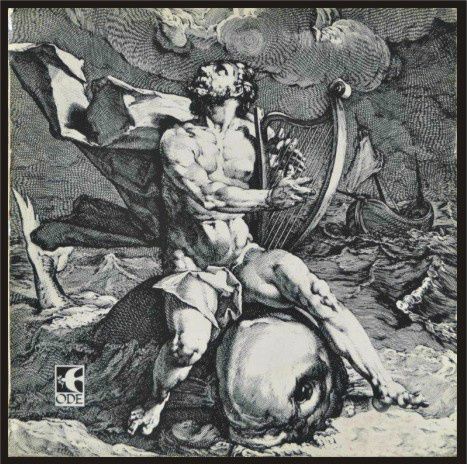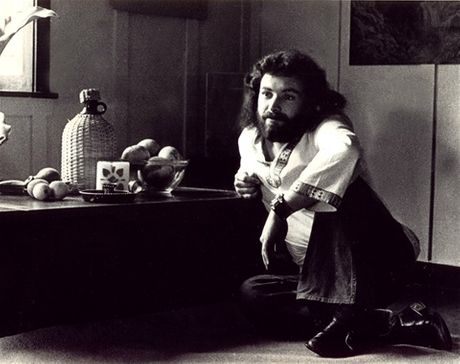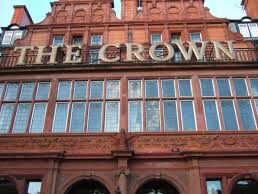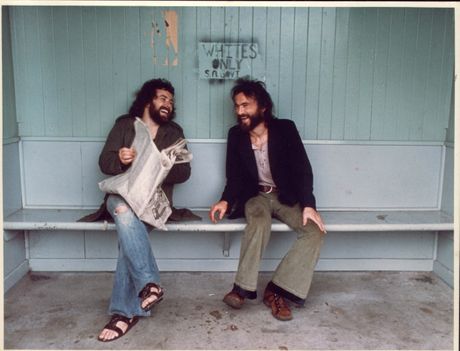New Zealand FolkRock
THE FIRST ODE ALBUM (1973)
Pelorus Jack's award-winning cover art, 1973.
- The First Album -
"SPIRIT 0F PELORUS JACK"-
ARTIST: John Donoghue
LABEL: Ode Records (SODE-040)
WINNER: NZ Album of the Year Award 1973
WINNER: NZ Album Cover of the Year Award 1973
__________
ALBUM CONTENTS:
Song for a Princess
Regrets and Things
Like an Old Time Movie
Hardly been Worthwhile
Spirit of Pelorus Jack
Be my Friend
Song
for Vanda
Worm's Eye View of Blackpool
A Pretty Song
Geraldine
____________________
CREDITS:
Piano, Acoustic Guitar & Vocals: John Donoghue.
Acoustic & Electric Guitars & B/V's: Martin Hope.
Bass Guitar & B/V's: Graeme Thompson
Drums, Piano, Accordian & B/V's: Steve McDonald
Saxophone: Johnny McCormick.
Engineer: Frank Douglas
Producer: Terence O'Neil-Joyce.
Art Direction: Don King
Photos: Susy Pointon
Recorded
at: HMV Studios, Wellington NZ.
______________________________
SPIRIT OF PELORUS JACK
- THE ALBUM -
A Folkrock Debut
Following the Loxene Golden Disc success of "Dahli Mohammed" in 1972, Ode Records producer Terence O'Neil-Joyce suggested that I round up some musicians and
record an album of original songs.
Straight away I saw it as an opportunity to move away from the harder rock genre that Timberjack had been involved in and into the folkrock genre
I had been introduced to with the "Three Shilling Club," a regular acoustic gathering held in Cricklewood, London, in 1970. (see below)
Following Timberjack's split in 1971 I moved into a house in
Palmer street, Wellington. I was soon joined there by NZ guitarist Martin Hope of the Fourmyla band, fresh back from London and also an ex-member of the Three Shilling Club.
As luck would have it,
the Palmer street house happened to be directly across the road from the Wellington Folk Centre.
In those days I was still finding my feet as a song writer. I would sketch out a song in my little red
room at Palmer Street, race across the road to the Folk Centre and then test the song out on a bemused live audience.
Work on the project was interupted when at first Martin, and then myself, moved
to Auckland to join the Human Instinct. (see History Part Two - Human Instinct) Eventually a date to record the album was set at EMI Studios
in Wellington.
Martin and I flew down from Auckland for two quick rehearsals with Miramar Musicians Steve McDonald and Graeme Thompson before entering EMI studios to knock out the album in two short
sessions.
Wellington Musician Johnny McCormack (actually he's a Palmy, loud and proud) contributed the sax solo on the track "Regrets and things," and on doing so created a template for the next album.
"Spirit of Pelorus Jack" (the album) went on to win "New Zealand Album of the Year" at the 1973 NZ Music Awards.
Terence O'Neil-Joyce's album cover
design deservedly won "New Zealand Album Cover of the Year" at the same awards.
________________________
London's historic venue, the Cricklewood Crown.
THE
THREE SHILLING CLUB
A Folkrock Genesis
--LONDON 1970-
John Donoghue:- “Frits, Steve and I got a small flat in London, on the Edgeware road at Cricklewood,
and scored some gigs for the band at the local pub, the “Cricklewood Crown.” One Saturday Frits and Steve turned up at the flat with Carl Everson, of the Fourmyula. They had ran into him on Edgeware Road, and it turned out the Fourmyula were living
within walking distance of our place. They had a house in Willesden Green, and we saw a lot of them after that. They were as poor as we were. But somehow their life seemed more glamorous."
From "Memories of NZ Musicians" - (Dizzy Limit Band)
AND THEN...
...one
by one my Dizzy Limit bandmates all got day jobs. This meant they could now afford to sample London's night life, so on the weekends I would find myself alone in our little flat at Cricklewood.
The
Fourmyula's guitarist Martin Hope had the opposite problem. His was a seriously crowded house on the weekends. So, if he had a Friday or Saturday night off, he would stroll over to Cricklewood and the two of us would spend an evening jamming on our acoustic
guitars.
Martin was as broke as I was, but he'd bring one lone shilling that he'd managed to beg, borrow or steal from somewhere. Martin's shilling would feed the gas meter in our flat and make the
gas stove go. I'd scrape up a shilling from somewhere for the electric meter that gave us lights to see by.
Soon we were joined by Martin's friend, Kiwi guitarist Lee Baker, who
owned and played a Martin Dreadnought acoustic guitar. I was so impressed with Lee's guitar that I vowed one day to own one just like it, and two years later, while with the Human Instinct, purchased a Martin D-18 Dreadnought that I still own and cherish to
this day.
Lee was performing with his Dreadnought guitar around the London Folk Circuit and along the way, picking up a treasure trove of traditional fingerstyle techniques from
the London Troubadours he was mingling with.
Lee was generous with his knowledge and passed on the various acoustic guitar techniques that he was learning to
Martin and myself. In return, Martin and I would show Lee the electric guitar licks and riffs we were playing in our rock bands.
Lee also brought a shilling along
to the gathering, and his shilling fed the TV meter. So with our three shillings combined, we could take an hour off from our acoustic jamming to make coffee, grill up toasted sandwiches and watch the BBC saturday night live music program on TV, which would
inspire us to jam on into the wee hours.
Thus, the "Three Shilling Club" was born, and continued until I left London in late 1970.
___________________
Martin Hope left the Formyula in 1971 and returned to New Zealand, where he and I would take the folkblues of the Three Shilling Club with us into the Human Instinct, which was to considerably influence the band's sound and style.
Lee Baker also eventually returned to New Zealand, where he put his electric chops to good use playing in various bands throughout the 1980's. He has since carved himself out a successful career in the New Zealand Film industry.
The Three Shilling Club also permeated into my songwriting, resulting in the nest of folkrock songs that would manifest as 1973's award-winning album "Spirit of Pelorus Jack."
___________________
FEATURED TRACK: Worms Eye view of Blackpool
John Donoghue (L) & Martin Hope (R) enjoying the reviews, Mt Eden, 1973 - Photo Susy Pointon.
AND HERE'S WHAT THE PRESS HAD TO SAY...
( WELLINGTON EVENING POST - 1973)
PRIZEWINNING SPIRIT
If there were any prizes going for the best presented record ever in New Zealand, then John
'Timberjack' Donoghue's "Spirit of Pelorus Jack" would win it easily.
I mentioned John's record a few weeks back when I heard a first pressing, but now I have the whole package,
and I'm very impressed.
The cover is a foldout one with a striking front cover showing Arion riding a Dolphin. It opens to reveal all the words of the songs printed on the
left side and the cover motiff repeated on the right side along with an excellent track by track listing of personnel.
As well there are three excellent colour photographs
of the session musicians.
The art direction is listed as having been by Don King, and Terence O'Neil-Joyce of Ode Records must be well pleased by the final result.
I said before that John's songs were good and with a copy of the words they appear even better. The only song not written by John on the disc is by John Phillips and it is not saying too
much to say that Donoghue and Phillips have much in common in their lyric writing. Both use simple words in very effective ways and Donoghue also knows how to twist an image in a clever way - "..you wear your mind in the latest style.." from "Song for Vanda."
In the other three musicians, John has picked from the best and Martin Hope's guitar playing particilarly is fluid and pleasing. A lot of effort and loving care has gone into the production
of this album and it shows, because it is the best local release for a long time.
It's up to the public now to give John Donoghue the reward he deserves.
By Graeme Ingram
STORE
All tracks from the "Spirit of Pelorus Jack" album are available on Spotify



